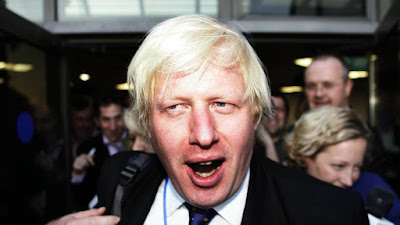The same is true of democratic decisions. Or perhaps I should say semi-democratic, or even partially democratic, decisions, since I’m thinking of the ‘election’ of the UK’s new Prime Minister, Britain’s buffoon Boris Johnson, or BoJo as we like to think of him, without affection.
 |
| Would you buy a used car from this man? (with apologies to the campaign against Richard Nixon) |
There was a time when I shared the view that many of my fellow Labour Party members still hold, that a party’s leader should be elected by its members. I’ve begun seriously to doubt that idea.
Jeremy Corbyn was elected by 303,209 Labourites. Some of them were councillors, representing around 5500 people. Most of them were simply individuals, representing no one but themselves. Unknown, self-selected, not subject to any kind of public scrutiny, they chose the leader of the Labour Party.
Just as 90,000 odd Conservatives have just chosen our Prime Minister.
Each Member of Parliament represents around 70,000 voters, since it is the duty of MPs to represent all their constituents, whether they voted for or against them, or didn’t vote at all. We know our MPs. They’ve been through a public vetting process.
It’s beginning to feel to me as though we’d be serving democracy better if we let them take the decision on who should lead their party or the country.
Especially as we live in what we like to think of as a parliamentary democracy.
Still, I have to admit that my view may be coloured by the choices party members have made in recent years. There was a time when the British system could point to a couple of virtues alongside its many faults. One was that it tended to produce stable governments. The other was that it produced able leaders.
Well, stability is a fading memory. In this decade, only Theresa May held a parliamentary majority for her own party, until she threw it away in an unnecessary and disastrously-run election. Apart from 2015-2017, government has been a cobbled-together business since 2010, made of coalitions or inter-party agreements.
There’s nothing inherently wrong with that. Plenty of countries are run all the time by coalitions. It’s just that Britain seems not to cope with them well, and the governments we’ve had over the last ten years have seemed to be always on the brink of tearing themselves apart.
So much for stability. What about the ability of the leaders? In the past, this came from people serving years in parliament, then for a while as hangers-on of government, then junior ministers, then in Cabinet. The process turned them from neophytes into experts, able to get the most from the system because they knew how it worked.
From time to time, there’d be people who shortcut this process. William Pitt the Younger, in the eighteenth century, Prime Minister at 24. Or Tony Blair, who became Prime Minister without previous ministerial experience, but then Labour had been out of office for 18 years and had precious few experienced people of the right kind of age to call on.
Pitt and Blair were exceptionally talented, think what you like of their policies. They rose to the challenge. But look who we have now.
In the red corner, we have Jeremy Corbyn. 32 years as a backbench MP, never having to deliver anything. A man who could limit himself purely to words, since no one with a sense of responsibility would let him anywhere near the authority to take action. He talked long and eloquently about a range of worthy causes which fascinated Islington dinner tables or Luton pub bars, but touched no one in the mass of the electorate. The results were predictable: unable to take a position on Brexit, he has put off voters from both camps; incapable of taking an intelligent position on antisemitism until just a few days ago, and then only under huge pressure, he has lost the trust of all but the shrinking band of his true believers.
In the blue corner, we have BoJo, who’s worse. Why, he has actually been through the experience mill. He was Mayor of London, with a tenure probably best summed up by his purchase, against expert advice, of second-hand water cannon from the Germans, no doubt with the intention of quelling resistance to his high-handed rule; they were never used and were finally sold for scrap at a massive loss, covered by taxpayers.
His most recent government experience, as Foreign Secretary, was even more deplorable. His ignorance of his briefs meant that officials were constantly having to correct his errors (“cleaning after him was quite a full-time activity,”, according to a Foreign Office colleague); he was rude to his hosts in a number of countries; he imperilled the life of a British subject imprisoned by the Iranians, and certainly extended her captivity, by his mishandling of negotiations with the Tehran regime.
In other words, he’s been tested. But far from making him any better, it just found him wanting. That, however, hasn’t stopped him being elected Prime Minister.
By 92,153 people.
Not an edifying sight. In fact, like the making of sausages, probably best left unseen.
No comments:
Post a Comment